


If your vet recommends or prescribes one of these formulas, there are several important nutritional and health issues to consider before making the switch from a premium healthy dog food. First and foremost, give both the ingredients label and the guaranteed analysis listing close inspections, as many of these formulas utilize substandard proteins (meat byproducts, chicken byproducts, animal digest, etc.) or fail to include protein sources of any kind in their first six ingredients. Many of the prescription-based vet pet food diets also include chemical preservatives, corn and other unnecessary fillers as major ingredients, high-purine ingredients, added salt, and/or potential allergens in the form of soy, corn, and/or egg products.
There are also the important issues of price and palatability to consider. Some of the vet diet formulas can cost upwards of $3 a day to feed a 50 lb. dog, compared to $1 or less for most premium healthy pet food brands. Plus, many dogs do not take well to the diets – not at all surprising given the lack of protein sources in many cases – and need to have gravies (which can be high in purines) or treats added to the foods before they'll eat them.
Additionally, many of the vet diet pet foods for kidney and urinary issues are only recommended for intermittent or supplemental feeding, as opposed to being used as part of a long-term wellness diet for your dog or cat.
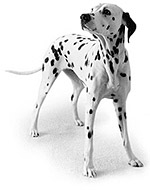 low in salt, and, for Dalmatians in particular, low in purines (components of certain foods – primarily found in animal proteins – that metabolize into uric acid in the body).
low in salt, and, for Dalmatians in particular, low in purines (components of certain foods – primarily found in animal proteins – that metabolize into uric acid in the body).
Some of the newer scientifically developed premium wellness pet foods for dogs and cats meet the ideal diet criteria while also delivering highly nutritious, balanced wellness diets that can boost your pet's immune system and give him or her a shinier coat, healthier teeth and gums, and more energy. Flint River Ranch in particular has developed several premium wellness dog food formulas that offer the highest quality human-grade protein and grain sources without using large amounts of high-purine ingredients.
The following is a handy guide for comparing many of the prescription-only pet food diets commonly recommended for pets and pet breeds prone to urinary tract problems (including kidney and renal issues) and commercially available premium health pet food diets, as well as some of the pros and cons to consider for each of the diets. This is not a comprehensive list by any means, but we do hope to continue adding additional formulas for comparison. We welcome and encourage feedback on the list.
Notes and additional information for the various fields can be found following the listings.
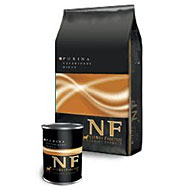 |
Description:
Purina Vet Diet NF Kidney Function canine dog food formulas provide complete and balanced nutrition for adult maintenance and have been formulated for dogs with renal failure, calcium oxalate urolithiasis, early stages of congestive heart failure, or hepatic disease. Purina Veterinary Diet Feline NF cat food formula also available
Pros:
Palatable diet, low purine content in dry food, low phosphorus and low sodium content, Omega 6 and Omega 3 fatty acids, lower cost to feed than most prescription-based diets
Cons:
No protein sources listed in the first six ingredients for dry food, contains animal digest (unspecified parts of unspecified animals, with no control over quality or contamination), whole grain corn (unnecessary filler) is the first ingredient listed, contains added salt; canned formula is chemically preserved with BHA, canned formula also includes high-purine liver as its primary protein source
|
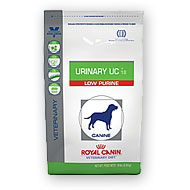 |
Description:
Waltham's Royal Canin Vet Diet Urinary UC 18 Low Purine dog food is a new formula from Royal Canin formulated to help prevent and manage canine lower urinary tract disease due to urate stone, cystine stone, and xanthine urolithiasis in adult dogs
Pros:
Higher protein level than most vet diets at 18% (albeit with low protein content from meat sources); dry food is naturally preserved; low purine and low phosphorus content; added Taurine, Omega 3 fatty acids, and antioxidants
Cons:
Expensive to feed ($2.90/day for dry food); no meat protein sources listed in the primary ingredients, ground corn and corn gluten meal (unnecessary fillers) are in the top five ingredients; several potential allergens in main ingredients (wheat, egg, and corn ingredients); higher sodium content than most prescription diets
|
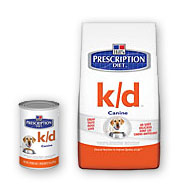 |
Description:
Hills Prescription Diet Canine k/d dog food has been scientifically developed by veterinarians to aid in the management of dogs with kidney disease and similar conditions. Hills Prescription Diet Feline k/d formula also available
Pros:
Low purine, low phosphorus, and low sodium content; added Taurine, Omega 3 fatty acids, and antioxidants
Cons:
Low in protein at 12% (but higher than Hill's u/d formula), no protein sources in the first six ingredients, chemically preserved with ethoxyquin, includes corn gluten meal and pork fat as major ingredients, contains soy fiber (a potential food allergen), also contains added salt, dogs tend to dislike the taste and smell of the food
|
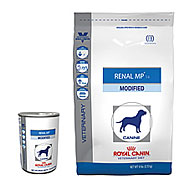 |
Description:
Royal Canin Vet Diet Canine Renal MP 14 dog food (formerly sold as IVD Canine Select Care Modified for Chronic Renal Failure - CRF)) and Canine Renal LP 11 dog food restrict excessive protein and phosphorous to help aid in managing renal disease and urolithiasis. Renal MP 14 aids in managing chronic kidney disease and Renal LP 11 aids in managing late stage chronic kidney disease in adult dogs
Pros:
Low phosphorus and low sodium content; chelated minerals for improved nutrient absorption; dry food is naturally preserved
Cons:
Canned food uses chicken by-products and meat by-products as its primary protein sources and is chemically preserved with BHA/BHT; dry food formula features corn as the second ingredient and chicken fat as the third ingredient, also contains corn gluten meal
|
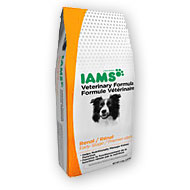 |
Description:
Iams Veterinary Formula Renal Early Stage Dry Dog (formerly sold as Eukanuba Veterinary Diets Early Stage Kidney Formula is designed to address the nutritional needs of your dog once kidney problems have been identified by your veterinarian. It provides optimum protein levels to help maintain body condition, muscular mass, and immune and organ function.
Important Note: Some lots of Iams Veterinary Formula Renal Early Stage have been recalled as of July 2010 Pros:
Low purine, low phosphorus, and low sodium content; higher protein content (18%) than most prescription diets for urinary / renal problems
Cons:
Corn meal and corn grits (unnecessary fillers) are the first two ingredients, contains ethoxyquin (a potentially harmful chemical preservative), includes high-purine brewer's yeast, contains added salt, some Iams Vet Diets weight management formulas contain chromium tripicolinate
|
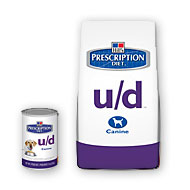 |
Description:
Hills Prescription Diet Canine u/d dog food formula is scientifically developed to aid in the management of dogs with problems associated with urolithiasis, specifically calcium oxalate, urate, and cystine urolithiasis, and can also be used to help dogs with advanced stages of renal disease. Hills Prescription Diet Feline c/d cat food formula for FLUTD also available
Pros:
Low purine, low phosphorus, and low sodium content; added Taurine, Omega 3 fatty acids, and antioxidants
Cons:
Only 8% Protein!! No protein sources listed in the first six ingredients, chemically preserved with BHT and BHA, second major ingredient is corn starch, includes pork fat as a major ingredient, contains soy fiber (a food allergen for some dogs) and added salt, dogs tend to dislike the taste and smell of the food
|
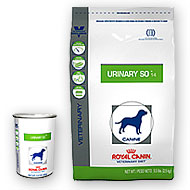 |
Description:
Waltham's Royal Canin Vet Diet Canine Urinary SO 14 (dry) and Urinary SO (canned) dog foods are formulated to aid in the prevention and management of canine lower urinary tract disease. Royal Canin Veterinary Diet Feline Urinary SO also available
Pros:
Dry food is naturally preserved, low purine and low phosphorus content, added Taurine
Cons:
Expensive to feed ($2.80/day for dry food); canned food uses meat and chicken byproducts as primary protein sources, corn grits (unnecessary filler) as the main grain source, and chemically preserved animal fat (preserved with BHA/BHT); for the dry food, the protein content is on the low end (13.2%), ground corn and corn gluten meal (unnecessary fillers) are in the top five ingredients, and more chicken fat is used than chicken meal in the formula; higher sodium content than most prescription diets, both canned and dry foods are intended only for intermittent or supplemental feeding. Some production lots of Royal Canin Urinary SO were recalled as of Feb 2006 — see recall news alert
|
New: By popular request we've added complete ingredients listings and guaranteed analysis information for each of the dog food and cat food formulas. Click on the 'Ingredients' or 'Guaranteed Analysis' buttons associated with each of the pet food formulas to display the information for that formula. The information displays above these buttons (beneath the title bar).
Also by popular request we've added 'Buy Now' buttons (updated as of October 2011). These buttons link to sites with the lowest prices found for the dog foods and cat foods. Note that many of the veterinary prescription diets require a prescription in order to purchase. Veterinarians are required by law to provide a written prescription upon request, making it possible for you to save money by purchasing for less online (or elsewhere).
Notes on Prices: The prices listed for the dog and cat foods above do not include sales tax (or shipping from online merchants), and may vary from region to region (and from store to store). New: The percentages listed in the price inc. tabs reflect the increase (or decrease) in price for the given pet food over the last 24 months. Prices last updated as of October 13, 2011.
It's important to note that in the year and a half following the massive international pet food recall in 2007 prices increased dramatically (ranging from 20% to as much as 70%!), largely due to an increased use of U.S.-only ingredients in the wake of the recall as well as increased production and shipping expenses. Pet food manufacturers have also frequently resorted to decreasing the size (total weight) of their bags, and in many cases (especially with the veterinary diet dog foods) have significantly increased prices while also decreasing the dog food bag size.
This trend continued in 2010, with many pet food manufacturers increasing the price of their pet foods while also decreasing the size of the dog food bags. Science Diet Hill's, for example, increased the price of their Prescription Diet u/d formula 35% — on top of a 59% increase during 2008 — while also "downsizing" the bag size from 40lbs to 27.5lbs. All but one of the prescription diets increased in price and/or decreased in size during 2010.
Note on Cost/Day Prices: The cost per day figures are for the dry dog foods only and are based on the manufacturers' suggested feeding recommendations for a 50 lb. dog, which are as follows: 2 1/2 cups/day - Purina Canine NF, 3 1/3 cups/day - Iams Renal Early Stage, 4 cups/day - Royal Canin Canine Renal MP 14 , 2 3/4 cups/day - Hill's Prescription Diet u/d, 3 cups/day - Hill's Prescription Diet k/d, 4 1/2 cups/day - Royal Canin Urinary SO 14, 3 2/3 cups/day - Royal Canin Urinary UC 18 Low Purine, 2 cups/day - Flint River Ranch Lamb and Rice, 2 1/8 cups/day - Flint River Ranch Duck and Potato, 2 1/8 cups/day - Flint River Ranch Fish and Chips, and 1 3/4 cups/day - Flint River Ranch DryWater Dog Food.
Notes on Ratings: The star ratings for the prescription and premium wellness pet foods are based on four factors: ingredients (well-balanced diet, low/high purine content, added vitamins and minerals, presence – or absence – of unnecessary fillers, artificial additives, and chemical preservatives, etc.), guaranteed analysis (primarily with respect to protein, phosphorous, and sodium content), daily cost to feed, and palatability (a taste and smell combination that's appealing to dogs). Pet food manufacturers are not required to list the level of purines in their pet foods, leaving it up to the consumer to research the exact purine levels in a given pet food.
IMPORTANT DISCLAIMER: No ratings or claims are made for the efficacy of any of the dog food formulas listed on this page. No pet food can claim to offer a cure for kidney or urinary diseases; however, a nutritious and balanced wellness diet may strengthen the immune system and improve vital organ function (among other health benefits), which may help to prevent and/or manage renal and urinary health issues. The information on this page is provided for educational purposes only and is in no way meant to be interpreted as veterinary advice. Nutritional veterinary advice on a specific pet's case cannot be given due to laws regulating veterinary licensing, and any decision to change a pet's diet should be made in consultation with a veterinarian and/or licensed pet nutritionist.
If you're looking for additional information on Flint River Ranch pet foods and products, we'd like to recommend: